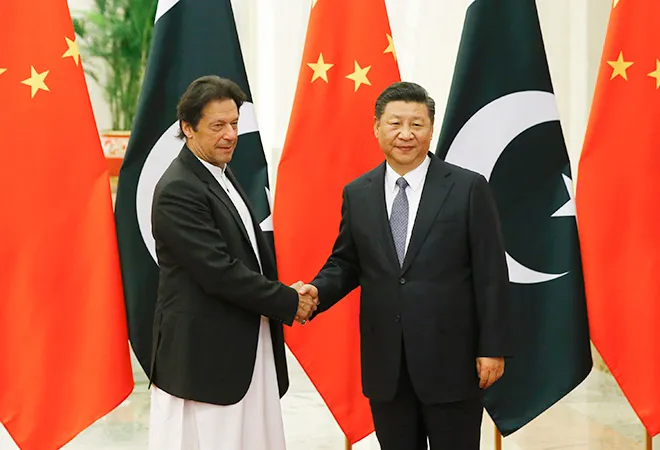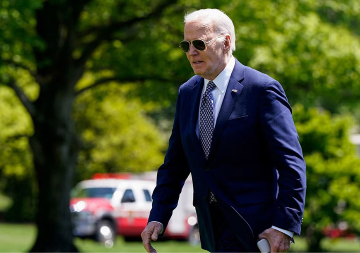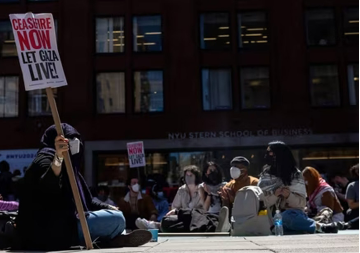
Masood Azhar-led Jaish-e-Mohammed (JeM), responsible for the attack on the CRPF convoy on 14 February, is one of the many terror groups Beijing considers as important cogs for security and stability in its restive Xinjiang province. Masood Azhar is also Beijing’s go-to man to ensure security of its geostrategic investments under the China-Pakistan Economic Corridor (CPEC), China’s flagship project under the Belt and Road Initiative (BRI) in the Af-Pak region, one of the world’s most crowded terrorist landscapes.
Sadly, China’s self-appeasing approach towards their quixotic man has not changed after the recent suicide attack at Pulwama, in which over 40 CRPF personnel were martyred. Though the attacker was a local Kashmiri, his ideological indoctrination was done by the JeM chief and his cadres. China was virtually the last country to condemn the attack. Its official statement lacked any direct reference to either Azhar or his terror group. Genh Shaung, spokesman of the Chinese Foreign Ministry, simply mentioned that China has “noted the reports of suicide terrorist attack” and expressed “deep condolences and sympathy to the injured and bereaved families”. He reiterated China’s official stand on Masood Azhar being named as global terrorist by the UN Security Council: “as for the issue of listing, I could tell you that the 1267 Committee… has a clear stipulation on the listing and procedures of the terrorist organisations”.
The attitude of Beijing was further exposed when the state-run Global Times published a news brief under the headline “Indian Army officer killed in blast in Indian-controlled Kashmir” on 16 February 2019. This brief merely made a passing reference to the Pulwama attack: “on Thursday as many as 40 security personnel were belonging to the paramilitary force … were killed, and many others injured in a massive blast in the Pulwama district”.
China’s romance with terrorists in the AF-Pak region has a historical legacy based on its vested economic, security and geostrategic interests. China’s Uyghur Muslim-dominated Xinjiang province came under religious and cultural influence of Pakistan as it was opened up post the reform period of 1978.
Pakistani mullahs started teaching the fundamentals of Islam and their distorted interpretation of jihad to inflame the Uyghurs in the wake of the Afghanistan situation. Such misplaced religious awakening created centrifugal tendencies among Uyghurs who started anti-China agitations in Xinjiang in 1980, 1981, 1985 and 1987. The situation changed after the collapse of the Soviet Union as the Afghan mujahedeen gained power in their country. Provoked by Pakistani mullahs, separatism in Xinjiang gained momentum and demonstrations erupted in certain places at Urumchi, Kashgar, Khotan, Kucha, Aksu and Artush. The tipping point for the Chinese was the Baren incident, where Uyghurs started mass protest on 6 April 1990 to wage jihad against the Chinese and establish the East Turkestan state. The ensuing riots – where the Uyghurs used bombs and pistols against the police and government officials – resulted in the deaths of six police officers. China blamed foreign interference for the unrest and alleged that the rioters were trained in the Af-Pak region. Post USSR’s disintegration, fears that foreign powers will use the Taliban and Pakistan-based terrorists against China grew in Beijing.
Beijing’s response was two sided. Internally, they resorted to a state response that was nothing short of an ethnic cleansing. Even today, over one million Uyghurs are reportedly imprisoned in re-education camps (concentration camps) across Xinjiang.
Externally, China courted with the Taliban and other terror groups to contain any “spillover” of terrorism to Xinjiang. China hoped that its romance with extremist groups in the Af-Pak region would prevent them from supporting Uyghur separatism and the East Turkestan Islamic Movement (ETIM).
China’s “narrow approach” and “self-driven diplomacy” became visible when China’s ambassador to Pakistan Lu Shulin met Taliban leader Mullah Omar in November 2000. This was first time when a senior diplomat of any non-Muslim country had a meeting with the Taliban leader. Mullah Omar promised that Taliban will not allow Uyghurs to launch attacks on China in Xinjiang, with a conditionality that they will continue to remain in the Taliban ranks. Even after the US’ attack on Taliban in 2001, China continued to maintain its relationship with quetta shura and provided arms and ammunition to Taliban by adopting a “narrow approach” and a “self-driven diplomacy that gave China good fallouts”. After the Gulja incident of 1997, Xianjiang has neither witnessed any major terrorist attack, nor have automatic weapons been used by the Uyghurs in the restive region.
Economic and geo-strategic interests
Located in northwest China, Xinjiang is the starting point of China’s much-hyped BRI projects, especially the controversial CPEC. The motives behind CPEC are clearly to serve China’s own geostrategic and economic interests than helping Pakistan’s ailing economy. CPEC’s infrastructure projects connect Kashgar in Xinjiang to Balochistan’s Gwadar port, giving China ready access to West Asia and Africa for its energy imports. CPEC thus greatly reduces China’s dependency on the traditional route through the narrow Strait of Malacca, which, if cut, can choke Beijing economically.
It is estimated that 5,00,000 Chinese nationals will be living in the Gwadar port city by 2022. China is courting Azhar to secure the CPEC and the Chinese living in Pakistan.
Although China largely believes that Pakistan is willing to fight terror groups for its interests, the crowded terror landscape in Af-Pak region has made Beijing sceptical of Islamabad. China forced Pakistan to act against the seminary at Lal Masjid in 2007 as the fundamentalists living in that seminary were involved in abduction of Chinese girls who ran a beauty parlour. The Lal Masjid episode and the death of Abdul Rashid Ghazi inspired terror groups to wage global jihad. Within six months after the Operation Sunrise following Lal Masjid episode, more than 40 terror leaders – who held sway over 40,000 militants – gathered in Waziristan on 14 December 2007. They formed a united front – Tehrik-I-Taliban Pakistan (TTP) – that vowed to avenge the killing of Abdul Rashid. Lal Masjid episode became a rallying cry of the TTP to fight the Pakistani establishment. The resulting acts of terror accounted for the deaths of 1,188 people, with 3,209 wounded in 88 bombings in just one year after the Lal Masjid siege.
Masood Azhar formed the JeM in 2000 to weaken India’s control of Kashmir through concerted terror attacks on government targets. Azhar, owing to his oratory skills and reputation as a jihadi recruiter, became an asset for Pakistan. However, after the formation of the TTP, the JeM joined its ranks with the coalition and operated in Pakistan as part of the TTP. However, the Pakistani army and the ISI revived the JeM once again in 2008 under its “good” versus “bad” terrorists’ strategy. After 2011, ISI accommodated all “good terrorists” who had joined the TTP before the operation Zarb-e-Azab, wherein Pakistani armed forces carried out operations against the terror coalition. These so-called good terrorists joined the JeM to wage jihad in Kashmir and aid the Taliban in Afghanistan. Thus, the revival of the JeM transformed bad terrorists into good terrorists under Azhar’s leadership. Besides being a member of United Jihad Council (UJC), Azhar has close links with radical religious groups like Jamait-i-Ulema-I-Islam – Fazlur Rehman faction (JUI-F), Sipah-e-Sahaba, Lashkar-e-Jhangvi and Harkatul-ul-Mujihideen.
China recognised Azhar’s influence over radicalised elements and used him to safeguard its own strategic and economic interests in the region.
China is also not happy with India’s warm relationship with the Afghan government. Azhar’s influence is therefore covertly used by both Pakistan and China to strengthen the Taliban, who are averse to Indian interests in Afghanistan as well as in Kashmir. Exposing its double standards on terrorism, Beijing also held direct talks with Baloch terrorists, who are considered “bad terrorists” and are not under the influence of the JeM, in February 2018. India’s relationship with the US after 2001 and the signing of Logistic Exchange Memorandum of Agreement (LEMOA) are the other factors that have provoked China to appease Masood Azhar and also to court the Taliban. In August 2016, Global Times carried an editorial which stated: “if India hastily joins the US alliance system, it may irritate China, Pakistan and even Russia. It may not make India safer, but will bring strategic troubles to itself and make itself a centre of geopolitical rivalries in Asia”. The same newspaper published an editorial on 10 November 2017, saying: “when India criticises the world of double standards on terrorism, it has itself long supported separatist groups in Pakistan’s Balochistan province who launch terror attack in the country”. As if on cue, Pakistan conveniently blamed India for the 23 November 2018 attack by Baloch militants on the Chinese consulate in Karachi.
Post the Pulwama carnage, there is a feeling in some sections that increased pressure from the Indian government may force China to rethink its stand on Masood Azhar. However, considering Beijing’s “narrow approach”, such a move at this juncture will only make China and the Chinese people living in Pakistan more vulnerable to terrorism. China’s U-turn on Masood Azhar, therefore, seems unlikely.
The views expressed above belong to the author(s). ORF research and analyses now available on Telegram! Click here to access our curated content — blogs, longforms and interviews.




 PREV
PREV


